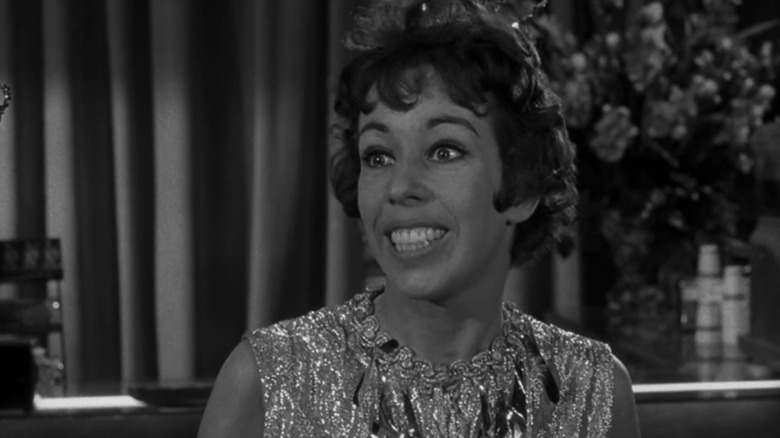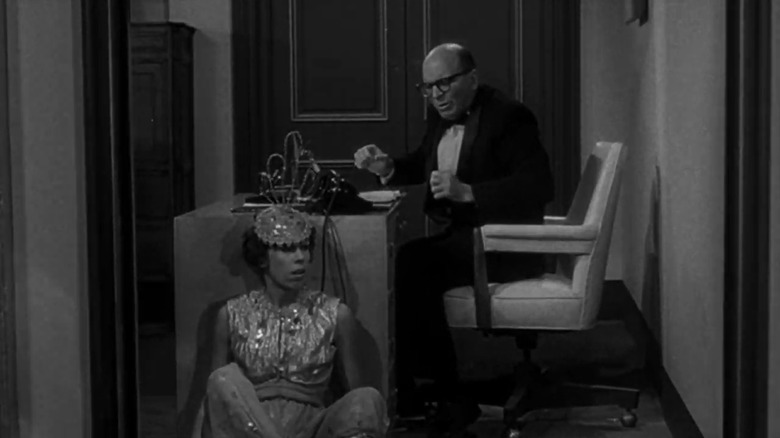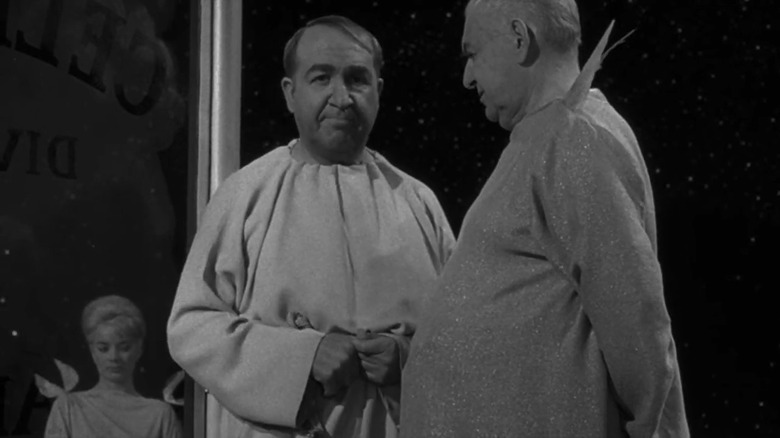Why Rod Serling Apologized To Carol Burnett After Her Twilight Zone Episode
The original run of "The Twilight Zone" went on for 156 episodes, and we're sad to say that not all of them were winners. For every "The Hitch-Hiker" or "Time Enough at Last," there was "The Bard" or "Sounds and Silences." Even with episodes that aren't widely agreed to be clunkers, odds are that the average viewer watching them today is going to be a little disappointed by about a quarter of the episodes. Sometimes the twist is too obvious; sometimes it's too out of left field. Sometimes it feels like the writers put too big a story into its half-hour slot; sometimes (especially in season 4) it feels like the stories are too padded.
Discussions around the show's hit-or-miss quality are also complicated by the fact that one man's garbage is another man's treasure. "Walking Distance" is usually considered one of the show's best, for instance, but I've always found the entry's nonstop dwelling on nostalgia to be sort of grating. A similar disagreement seemed to happen with showrunner Rod Serling and actress/comedian Carol Burnett in season 3, in which the two creatives came away with very different opinions of the episode they worked on together. As Rod Serling's daughter, Anne, explained in a 2012 HuffPost interview, Serling was embarrassed by how poorly Burnett's episode, "Cavender is Coming," turned out:
"Somebody had sent me a copy of a letter [Rod] had written to Carol Burnett saying how sorry he was that the show was so bad, and he would buy her a pastrami sandwich. She said something like, 'Oh, it wasn't so bad, but I don't like pastrami.'"
Serling's attempts at comedy
Rewatching "Cavender is Coming," it's easy to see why it wasn't so popular. It's not a dark or scary episode at all, and it relied on comical sitcom-y beats that don't seem to work that well. There are moments where Burnett's character Agnes, a clumsy woman incapable of holding down a job, says a line that sounds like it was intended for a sitcom with a live studio audience. Except there's no audience in the background laughing, so subsequent pauses from those lines feel awkward and hollow. In another episode of "The Twilight Zone," these weird stilted moments would've been a clue-in to the audience that something mysterious was going on, but there's no feeling of the sort happening here.
As it turns out, the episode originally did include a laugh track, and that was how viewers in 1962 experienced it. The episode now airs with the laughter removed, and fans have never seemed to agree on whether or not this was the right choice. Sure, the lack of laughter makes the bad jokes flop even harder, but a laugh track also simply feels out of step with the tone of a "Twilight Zone" episode. The show was never that great at being pure comedy, which is why so many of these most maligned classic episodes are the ones that aim for humor.
"I've seen a couple of [Rod Serling's] comedies," Anne Serling explained in that same interview, "but I don't think they quite worked. I like his dramas so much better." Although she clarifies that Rod in person was "the funniest person I'd ever known," this take on Serling's writing is pretty common. Serling was known in his time as the "angry young man" of Hollywood, not as the funny one.
A failed pilot
The other issue with "Cavender is Coming" is the way the main theme is both predictable and a little boring. The episode revolves around an angel (Jesse White) coming down to give Agnes a better life; he does this by trying to give her lots of money and throw her into a fancy party, but Agnes finds that she'd rather be poor and live with the friendly neighbors she already has. It's a shallow depiction of the class divide, one that leans perhaps a little too hard on the happy peasants/snobby aristocrat tropes to make for a compelling lesson. It also hurts that the final twist, that Agnes is in fact happier back in her old place in life and the angel isn't going to be demoted, is so obvious that it barely even counts as a twist at all.
The biggest issue, however, is that the episode is essentially a repeat of season 1's "Mr. Bevis," which features a guardian angel descending from the heavens to help out a down-on-his-luck man. The reason both of these episodes are so similar, in premise and execution, is they were both intended as pilots for a TV show, "The Side of the Angels." Serling loved the idea of an incompetent, booze-drinking angel having to go down to Earth and help out a random struggling human, but CBS passed on both of the scripts he wrote, and the show was never made.
On the bright side, Carol Burnett herself still seems to appreciate the entertainment in her episode. As recently as 2019, she was starring in MeTV ads to promote it. "Cavender is Coming" might not be anyone's favorite episode overall, but it helped launch Burnett to stardom, so maybe it was worth all the trouble in the end.


